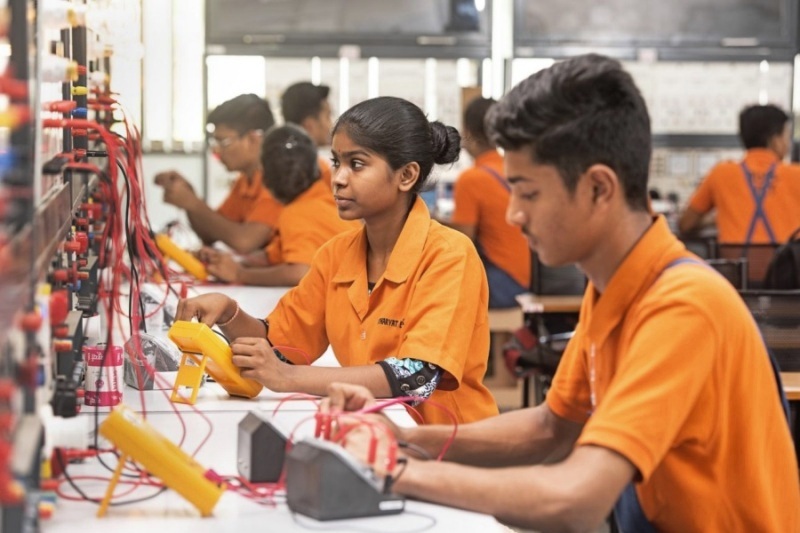 Given the accelerating urbanization and widening economic disparities, it is imperative to empower communities to achieve social justice and inclusive development. The key to this transformation lies in human capital—the collective skills, knowledge, and abilities of a population. Jatin Dhall, Executive Director, Third Planet Foundation, has dedicated his career to empowering individuals and communities through targeted skilling initiatives and strategic CSR programs.
Given the accelerating urbanization and widening economic disparities, it is imperative to empower communities to achieve social justice and inclusive development. The key to this transformation lies in human capital—the collective skills, knowledge, and abilities of a population. Jatin Dhall, Executive Director, Third Planet Foundation, has dedicated his career to empowering individuals and communities through targeted skilling initiatives and strategic CSR programs.
With over two decades of experience in Corporate Social Responsibility (CSR), NGO operations, and business management, Dhall has a deep understanding of the challenges and opportunities facing marginalized communities. Under his leadership, Third Planet Foundation provides comprehensive CSR solutions, from policy development to social impact assessment, focusing on bridging economic gaps and fostering social inclusion.
In this reflective article, Jatin Dhall explores the crucial role of skilling and CSR in shaping a sustainable future. He highlights the transformative impact of education and empowerment in addressing global challenges, illustrating how strategic partnerships and innovative approaches can drive meaningful change. Dhall's insights emphasize the importance of investing in human capital to create a more equitable and prosperous society, where every individual has the opportunity to reach their full potential. His analysis demonstrates how effective CSR and skilling initiatives can bridge economic gaps and foster inclusive growth.
Scroll down to read the full article.
Sustainable livelihood development and economic growth are reliant upon the progress of human capital. It includes the knowledge and skills people have, allowing them to add value to any economic system. It is essential to empower communities to achieve socio-economic equity and inclusive growth as urbanisation and economic gaps continue to widen. Investment in human capital by means of education and training leads to a productive and innovative workforce.
Our economy is on the steady path of becoming the third-largest in the globe. This is further bolstered by our vibrant demographic profile. A skilled workforce holds the key to attracting foreign investment and improving global economic competitiveness. By facilitating livelihood development, we can ensure greater social inclusion, sustainable development and reduction of inequality. Those nations ensuring all members of society gain fair access to education, skilling opportunities, are the ones promoting greater economic growth and prosperity.
The Union Budget 2024-25 specifically addresses the necessity of skill development in order to foster sustainable livelihoods in the face of the rising inequalities and due to the severe impactofthe last pandemic. Employment generation is a key priority for our nation, and the budget prioritizes robust policies and market interventions. One may notice significant obstacles here, as the present workforce is also faced with a distinct talent gap which is widening due to green transitions, geo-economic trends, technological changes, automation and the dynamic needs of the industry. These factors tend to pose risks to the livelihood of individuals. The World Economic Forum’s, Future of Jobs Report 2023 states that by the year 2027 we’d be looking at 43% of work duties getting automated. It is therefore, the need of the hour to invest in our workforce,and ensure that they are able to achieve their highest potentialhence, fostering a more equitable world.
Prioritizing skilling, upskilling and reskilling initiatives in order to remain informed and relevant in today’sdiverse and expanding marketsindustries is what is most needed.It’s interesting to note that skill development is not only crucial for productivity, employability, earning potential and possibilities;but it also establishes strong correlations between employment and the labour force. In today’s scenario it has grown into an essential and a practical tool for the economy’s sustainable growth. Upskilling emphasises on acquiring new skillsets within one’s existing field, and reskilling allows the professional to transit into a wholly new role or industry. As our industries, the job market, and more so, job roles undergo digital transformation and fast-paced automation,reskilling gains a more pertinent role due to the nature of its adaptability.
We must equip our communities with the skills needed to secure their careers, as Artificial Intelligence, Machine Learning, Data and Analytics enable greater automation. Aligned with these challenges and prospective opportunities, the government too prioritizes skilling initiatives focused on innovation and emerging technologies. As of August 2023, India boasts a talent base of 416K AI professionals, which is expected to satisfy the increasing demand, that is expected to reach 1 million by 2026. This makes us a global leader in terms of AI skill penetration and talent concentration.
The success of these skilling initiatives is highly dependent on their levelsof accessibility and inclusiveness. How effectively they reach the marginalised communities, the traditional and rural population, and their ability to overcomelanguage barriers andcultural and socio-economic restraints.
The role of well-crafted Corporate Social Responsibility (CSR) initiatives, especially given their widespread reach,play a critical role in preserving and promoting sustainable livelihood goals in India. Over the years, data proves the success of CSR being a key instrument, as private organizations allocate funds to meet their social and environmental commitments. Several households have witnessed upliftment in their livelihood, increased incomes, and employment opportunities as a result of these initiatives, which include the development of micro-enterprises, skill sets, and vocational training programs. CSR grants have facilitated the establishment and growth of micro-enterprises, particularly in rural and semi-urban regions. Women and youth, in particular have greatly benefitted from these initiatives. However, complete transparency and accountability are crucial for successful implementation.
Collaborative partnerships among educational institutes, government and private organizations help establish a cohesive ecosystem. A notable example of such a collaboration is the Pradhan Mantri Kaushal Vikas Yojana (PMKVY), a flagship initiative within the Skill India agenda. In order to deliver standardized, industry-relevant skill development programs across diverse industries and verticals.
Education Technology or EdTech, presents a hopeful solution with its transformative potential to deliver quality education to students and young professionals in these communities. The virtual technology setups, mobile-based training modules, simulations, and online platforms these programs surpass boundaries and remote areas. Collaborations of CSR projects with EdTech arebeing seen as a mark of shared commitment towards nurturing equitable and socially inclusive livelihood growth.
As we progress, let us keep in mind that the success of skilling and livelihood development initiatives rests on each of us. As humans, we are drawn towards extraordinary technological advancements and by working together, using technology, and including everyone, we can create a world where no one is left behind and where our actions will be felt for generations to come. Skilling, upskilling and reskilling present a strategic solution helping our communities gain social inclusion, economic empowerment and competitiveness for themselves. With continued collaborations, CSR initiative continues to create a purposeful impact on the livelihood of people in India.





 Given the accelerating urbanization and widening economic disparities, it is imperative to empower communities to achieve social justice and inclusive development. The key to this transformation lies in human capital—the collective skills, knowledge, and abilities of a population. Jatin Dhall, Executive Director, Third Planet Foundation, has dedicated his career to empowering individuals and communities through targeted skilling initiatives and strategic CSR programs.
Given the accelerating urbanization and widening economic disparities, it is imperative to empower communities to achieve social justice and inclusive development. The key to this transformation lies in human capital—the collective skills, knowledge, and abilities of a population. Jatin Dhall, Executive Director, Third Planet Foundation, has dedicated his career to empowering individuals and communities through targeted skilling initiatives and strategic CSR programs.


.jpg)










